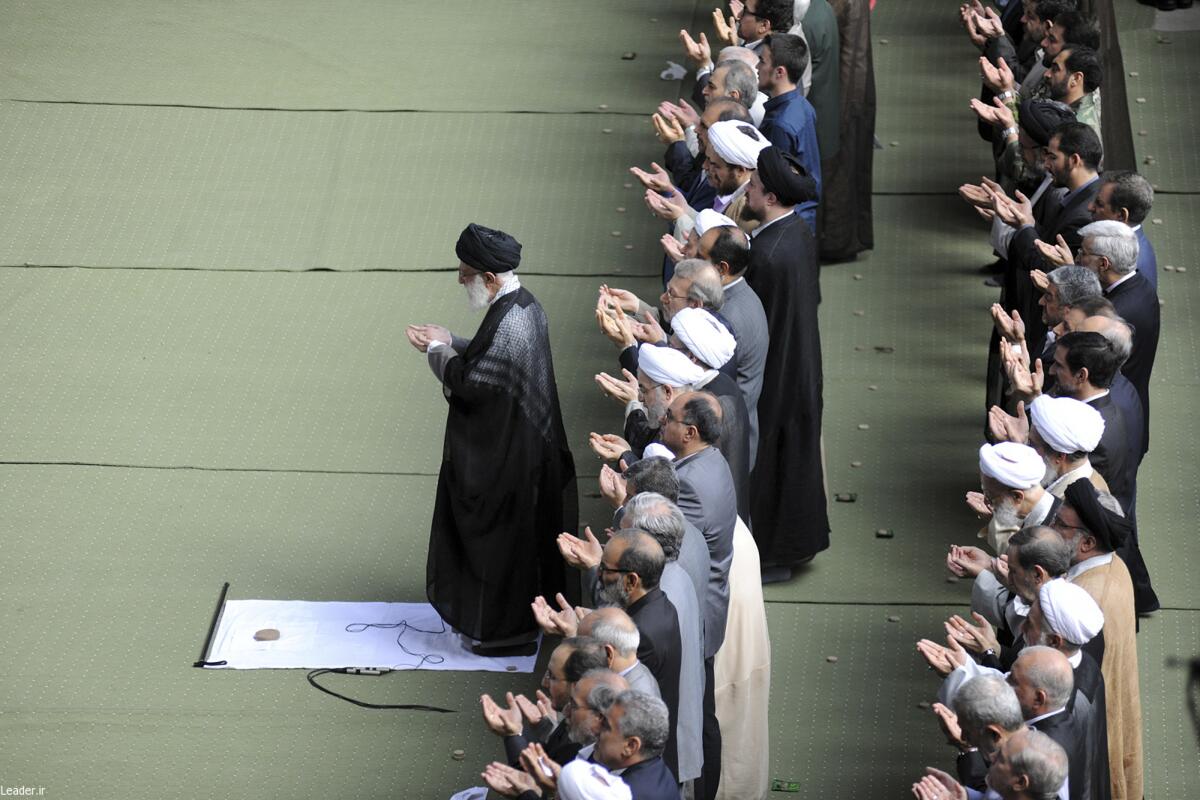Iran’s Khamenei: Policies toward ‘arrogant’ U.S. unchanged by nuclear deal

Iranian Supreme Leader Ayatollah Ali Khamenei leads the Eid al-Fitr prayer at the Imam Khomeini Grand Mosque in Tehran on July 18. Khamenei said the country’s historic nuclear deal with world powers won’t change its policy toward an “arrogant” United States.
- Share via
Reporting from Tehran — Iran’s supreme leader declared Saturday that his nation’s policies toward an “arrogant” United States would not be changed by the nuclear agreement reached with major powers in recent days.
Iran will continue to support the militant Hezbollah movement in Lebanon, the embattled government of Syrian President Bashar Assad and the Shiite Muslim Houthi rebels in Yemen, Ayatollah Ali Khamenei declared in televised comments.
Whether the nuclear agreement wins approval, “we are not going to stop our support for people in Yemen, Palestine, Syria, Iraq; and our politics toward the arrogant power of America will not change at all,” Khamenei said in an address to hundreds of officials on the occasion of Eid al-Fitr, the festival ending the fasting month of Ramadan.
His statements at a Tehran mosque were greeted by chants of “death to America” and “death to Israel.”
Iran and six world powers — the U.S., Britain, France, Germany, Russia and China — reached an agreement Tuesday designed to curb Tehran’s nuclear program, which despite Iranian denials, many in the international community fear is designed to produce weapons. In turn, the accord offers Iran eventual relief from punishing international sanctions that have crippled its economy.
In his own statement marking Eid al-Fitr, Iranian President Hassan Rouhani congratulated the nation for the “victory of their political will” in reaching the deal, which he has suggested could bring an era of better relations between Iran and the international community.
Khamenei, who often appeared to resist the concessions demanded during negotiations on the accord and expressed distrust that the U.S. in particular would live up to the agreement, acknowledged that he had approved pursuing the deal. But he insisted: “As I always said several times, we do not talk with America over bilateral issues or other issues, but nuclear ones, and these nuclear talks were exceptional ones. American policies are 180 degrees different from us.
“America regards brave Hezbollah [members] in Lebanon as terrorists but support the infanticide Israeli regime,” he said. “American statesmen and stateswomen are ranting these days; they claim Iran has been deprived from nuclear weapons, while the fatwa [Islamic religious edict] forbids production, storage and using nuclear weapons. They rant that they have brought Iran to her knees; I should say their dream never ever will be fulfilled.”
Iran has given aid and support to Hezbollah in its conflict with Israel, to Assad as the Syrian government battles rebels backed by the U.S. and others in the international community, and to Houthi rebels in their war with the ousted government of Yemen and its Saudi-led allies.
Khamenei, who has the final say in Iran over matters of state, did not suggest any personal resistance to the nuclear deal and noted: “They wanted to dismantle all cogs of our nuclear industry and stop our R&D [research and development], but now they have [to] tolerate our thousands [of] centrifuges and R&D.”
In his weekly radio address, President Obama acknowledged Saturday that the deal would not “resolve all of the threats Iran poses to its neighbors and the world” but defended the agreement as doing more than any past effort to assure Tehran does not produce nuclear weapons.
“As commander-in-chief, I make no apology for keeping this country safe and secure through the hard work of diplomacy over the easy rush to war,” he said. “We have before us an historic opportunity to pursue a safer, more secure world for our children. It might not come around again in our lifetimes.”
Mostaghim is a special correspondent.
More to Read
Sign up for Essential California
The most important California stories and recommendations in your inbox every morning.
You may occasionally receive promotional content from the Los Angeles Times.










